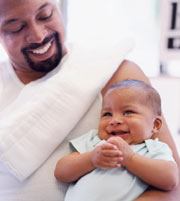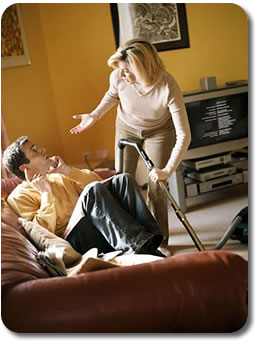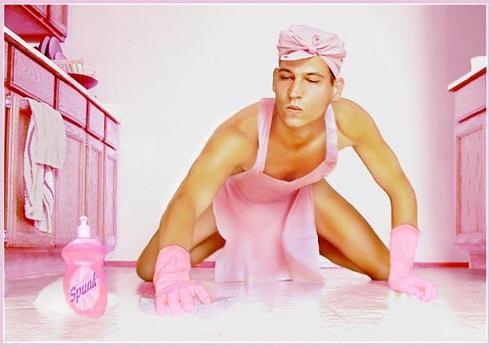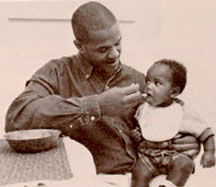 |
||||
|
The Chore WarsKAREN ZAGOR - December 5th 2006. Eleanor's husband, Paul, rarely watches Trailer Park Boys, so he takes full credit for coming up with the brilliant idea of taking their injured nine-year-old daughter to a vet. "Raven came back from the park weeping," says Eleanor, a Toronto landscape designer and mother of four. "She'd hit her arm on a metal bar." So Eleanor, who was expecting nine children for a birthday party, called her husband home from work and instructed him to take Raven to the hospital. "After the movie I called to check in. He said: 'Oh. It's fine. I took her to Anastasia [the neighbourhood vet -- not her real name]. She examined her arm and said there was no break.'" When Eleanor returned, Paul was sitting on the deck, contentedly drinking a beer. "It saved an awful lot of time and I'd been working all day," he says. "I was not looking forward to sitting in a hospital waiting room. And neither was Raven." While Paul's decision was perfectly rational -- children and dogs are not so different when it comes to their tendons and bones -- it also illustrates a sore point among men and women: when fathers are involved in child care, they do things differently.
That issue has come to the fore recently as men and women around the world do battle on the domestic chore front. You only need to browse the 172 responses to a posting about household chores last month on Leslie Morgan Steiner's Washington Post-sponsored blog, "On Balance," where parents sound off about home life, or trawl through the 128 letters in response to Salon's recent review of To Hell With All That: Loving and Loathing Our Inner Housewife, by Caitlin Flanagan, to know that who does what at home is a hot topic. "The gender caste system is still alive and well in most of our households," wrote Judith Warner in the New York Times upon the death of feminist icon Betty Friedan earlier this year. Warner, the author of Perfect Madness: Motherhood in the Age of Anxiety, notes that working women today do upwards of 70 per cent of household chores. Research from around the world consistently shows this to be true. Women spend more time on child care and housework than men, even when women are also spending as much time in the office as their partners. In Japan, a survey released this year revealed men do only one quarter as much housework as women. This, shockingly, is actually an improvement on previous surveys. The imbalance is often cited as a reason why Japanese women delay having children. Only in Norway and Sweden do you find virtual parity between men and women on the work and family fronts. In Canada, which falls between those extremes, working mothers spend 9.9 hours a day in a combination of paid and unpaid work, compared with 9.1 hours for dads, according to an OECD report released last year. Men do spend more time in the office -- 30 minutes more, on average. But women more than make up for it with child care and other unpaid labour: 78 minutes more per day. This may not sound like much until you calculate how many hours there are between walking in the door at 6:30 p.m. and collapsing into bed at 10 p.m., and how much dinner making, cleaning up and homework supervision has to be crammed in to that time. In Britain, Melissa Benn, a journalist, coined the term "married lone parent," or MLP, to describe overworked, exhausted females who were trying to be all things to all people with little support from their spouses. It caused a flurry of debate on parental chat lines, and the MLP is now part of the British lexicon. Kathy Lette has gone even further in her new novel, How to Kill Your Husband (and Other Handy Household Hints), which includes such chapter headings as: "The Working Mother's Week, or Where the Hell's Your Father?" The perception of women as desperate housewives spawned a glut of British reality television shows last year, including Bring Your Husband to Heel, starring a dog trainer and spouses in need of house training. Since most women, though, are no more likely to take their husbands to the dog trainer, or kill them, than they are to take their children to the vet, Spain may offer a more acceptable solution. A new marriage contract, introduced last year, mandates that husbands and wives share domestic responsibilities including housework and looking after children or elderly parents. The contract will allow women to cite domestic negligence in divorce proceedings -- a reasonable step in a nation where working women spend about three times as much time doing housework as men, and where fathers spend only 13 minutes a day, on average, looking after their children. The measures were introduced by Margarita Urķa, a member of parliament. "Men have to learn to start taking more responsibility in the home and women have to help them do this," she told the BBC. Spain isn't alone. Almost every government in the industrialized world has had a working paper on how to address the imbalance. Britain's Institute for Public Policy Research reported that, while the public expects a high degree of gender equality at work, most people expect women to look after the home and young children. In Australia, the federal sex discrimination commissioner, Pru Goward, launched a discussion paper last year on the family balancing act. Why the imbalance? Is it because, as the title of Joshua Coleman's book, The Lazy Husband: How to Get Men to Do More Parenting and Housework, suggests, men are intrinsically lazy? Coleman writes that one reason for the chore wars is that too many women choose, at least metaphorically, to spend unnecessary hours sitting in hospital waiting rooms instead of taking their children to the vet. He says some women have made their husbands lazy through a process he calls "gatekeeping." "People often gatekeep by complaining about the other's standards, by redoing tasks, or by refusing the other's offer of help," he writes, echoing sentiments widely voiced by participants on Morgan Steiner's blog. Those in academia who study the gender gap say there is some truth to this. "We don't just want our husbands to do the task, we want them to do it when we want them to do it, the way we would do it," says Linda Duxbury, of the Eric Sprott School of Business at Carleton University. "And men don't work well being micromanaged. We're not being micromanaged in the corresponding male chores." Duxbury, who authored a 2001 study on work-life conflict, describes an incident in which her husband was preparing dinner while she instructed him on how to chop onions. "He said: 'Linda, I'm either doing it or I'm not.' Women have to recognize that in some ways we are the authors of our own misfortune. We like to be martyrs. We like to complain." Still, Duxbury says it's not as simple as saying we have made our men the way they are. Neither is it merely about women being proactive in getting men to do more at home, as Coleman suggests. Husbands, like children, he writes, need incentives, and nothing is more likely to motivate a man than the prospect of sexual favours. He does not elaborate on what would be a suitable reward for women; presumably, their pleasure in a gleaming home is satisfaction enough. But what of, for instance, the responsibility of thinking about and planning family life? "It's very hard to measure," says Kerry Daly, a professor at the University of Guelph and co-chair of the Father Involvement Research Alliance. Daly is involved in a $1.6-million national study of fatherhood. "You don't see it in terms of who does the tasks. It's the planning, the orchestrating, the thinking, the calendar work. It is very clear in the studies I have done of dual-earner couples that the woman still takes responsibility for the planning." Melody [not her real name], a Vancouver journalist and mother of two teenagers, agrees. Melody often works late, so her husband has taken over the cooking and laundry duties. "But I'm still the executive parent," she says. "I'm in charge of making sure we get to the dances, the eye appointments, the doctor, the dentist and organizing summer camp. He is really good, but he doesn't remember from day to day what needs to get done." Alison, a Toronto lawyer and mother of two children under the age of four, uses similar boardroom language in describing the division of labour in her home. "He is good at doing tasks, and okay at doing some things unsolicited, but I chair most of it. I try not to downplay his contribution. He is very supportive. But we constantly fight about this and it's an issue because even for me to make To Do lists for him makes me resentful and takes an effort. Sometimes I can't stand the weight of it, that I'm the holder of the knowledge." Daly believes this pattern is rooted in the traditional model of the division of labour. "What's been difficult for women to let go of is that sense of responsibility and sense of accountability. We've changed some of our external behaviour -- the work activities that we do as men -- but we haven't changed this outmoded model," he says. One reason men and women approach housework, and child care, differently may have to do with our brains. "The neurobiology of men and women is different -- different on a structural basis, different on a chemical basis and different on a physiological basis," says Sandra Witelson, a neuroscientist at McMaster University who is respected in research circles for her studies on sex differences in the brain. Right now, there is still a gap between what scientists can see in the brain and what they know about how those differences play out, so any link is hypothetical. But "the crucial point here is that there are many neurobiological differences and they inevitably have consequences for thinking and behaviour," Witelson says. It has been well-documented on IQ tests that women are better at picking out details in pictures than men. "I think it's not unreasonable to say that this may be a factor in why a man can open a fridge and not see the bottle of wine at the back. We do that better for some reason," says Witelson. Still, if women can function in a work world largely constructed by men, men can do their share at home. "Because we are such highly cognitive creatures, we can do things that are contrary to our nature," says Witelson. "Human brains are very plastic and we're very adaptable."
But adaptibility, as she points out, only goes so far. My neighbour Jessica went out one sunny Saturday, leaving her husband in charge of her own children, then aged 8, 10 and 12, as well as my two daughters, who were 5 and 8. The children are generally well behaved and self-sufficient, which may explain why Chris, who works long hours during the week, felt relaxed enough to drift off to sleep. When Jessica returned at 8 p.m. and asked if their youngest had put on her pyjamas and brushed her teeth, Chris sheepishly confessed he had been asleep most of the time. While he was slumbering, the children had indulged in a session of butt-art, adorning their behinds with sunglasses and noses. Luckily, they had used washable markers. That's another intrinsic difference between men and women -- a mother might take a catnap while her own children played, but few mothers would be able to fall asleep if someone else's children were also in their house. From my own highly unscientific survey of friends and colleagues, it is clear men also do not see what women see. When they walk into the living room, they blot out the dust bunnies; when they buy apples, they don't notice when half are rotten. If we accept that men really are different and will always do things differently, including parenting and housecleaning, it could go a long way toward a ceasefire in the domestic wars. Women can learn to duck out of the kitchen and let their men cook, and be less critical if the towels aren't folded perfectly. Men can volunteer to do more of the drudge work, and recognize that signing consent forms, coordinating after-school activities and registering children for swimming lessons are essential and time-consuming parts of parenting. "Once fathers are in the home, they learn to take these things on and recognize how much work is involved," says Andrea Doucet, associate professor in sociology and anthropology at Carleton University, whose research focuses on fathers as primary caregivers. Her book, Do Men Mother?, is to be published in September. Doucet believes getting fathers to take parental leave is also important. And when it comes to the housework, pay someone else to do it if you can afford to, even if it's just for a few hours a week. Having someone clean your home may seem like a frivolous expense, but in the words of Linda Duxbury: "It's cheaper than getting a divorce."
|
|
|||
|
|
||||

REPORTING FOR DIAPER DUTYCHARLIE GILLIS - December 5th 2006. When we learned last fall that she was pregnant, my wife and I found ourselves tossed on the sea of emotions common to prospective parents. There was joy, underlaid by roiling insecurities about the impending changes to our lives. My own fears were fuelled by truths too embarrassing to admit: I had never changed a diaper, never bottle-fed an infant, hardly even held a baby. As a journalist criss-crossing the country and occasionally the globe, I had left infant care to others, figuring I could learn it all later by trial and error. Judging from the obvious anxiety in the eyes of the few parents who left their youngsters in my hands, this was poor reasoning. When babies made their way around rooms full of gleeful relatives, I was deemed most likely to fumble. Which is how I found myself recently in a low-rise hospital annex in Orange County, California, one of 10 first-time fathers who, like alcoholics hitting rock bottom, had suddenly realized they desperately needed help. The workshop was one of hundreds run each year under the heading, "Boot Camp for New Dads," a fast-growing U.S. movement that puts jittery pops-to-be together with "veteran" fathers and their infants -- all in the name of hands-on experience. Two previous Boot Camp attendees, Jamie and Joe, were waiting in my class with their six-month-old children, Sarah and Patrick, so we rookies could handle a baby far from the judgmental gaze of female onlookers. The old hands, presumably, would reassure us with tales of how they conquered diaper rash and late-night feedings. Peer instruction for inexperienced fathers is an idea that seems long overdue -- retarded, one assumes, by the same inertia that keeps men from asking for directions when driving in a strange town. With women firmly ensconced in the workforce, men whose fathers scarcely picked them up when they were infants are now expected -- and in most cases wish -- to approach child-rearing as a partnership. Yet many have put off actually learning the ropes of soothing, bathing, changing, and we are gripped by our own ignorance as the big day approaches. And it's not like there's much in the way of guidance. Prenatal programs in Canada tend to focus on mothers and the mechanics of childbirth, while much of the authoritative chatter directed at young parents manages to reinforce male anxiety. "It's one thing to say your marriage is going to 'change,' " griped one new father I met recently. "But what the hell does that mean? Change into what?"
For Greg Bishop, founder and "head coach" of the Boot Camps across the U.S., the knowledge gap cried out for an organized response. "I have 12 brothers and sisters," he said during an interview in his cluttered headquarters in Irvine, Calif. "I took care of lots of babies and changed lots of diapers, and after four of my own, I felt a lot of men would enjoy their babies more if they had a basic orientation." Bishop had also seen first-hand the grim consequences of male ineptitude: a trauma care consultant by trade, he had been in emergency rooms as staff treated babies who hadn't been fed, or had been accidentally dropped or shaken by frantic fathers who simply lacked the skills to quiet their crying. His concept was brilliant in its simplicity. Bring in a few dads with their babies so men could actually watch a guy changing diapers and mixing up formula. Let the newbies ask all the stupid questions they're afraid to utter with their wives around. "Women have instant networks for stuff," he says. "Men don't." The first few sessions were held at the Irvine Medical Center and advertised as "Bootee Camps," a reference to infant footwear that meshed poorly with masculine sensibility (not to mention hip-hop slang). "Boot Camp" resonated better, and since the first one back in June 1990, fully 150,000 have attended the workshops in 250 locations across the States. A group in London, Ont., is looking at being the first to offer the program in Canada. Contrary to their moniker, the workshops themselves strike a nice balance of therapy and male camaraderie. The one I attended in Orange County was led by Robert Grand, a 39-year-old schoolteacher in cargo shorts, his head shaved to the wood. Scrubbing a whiteboard at the back of the room, he seemed oblivious to the din of a gas-powered pressure washer operating outside, which was oddly reassuring (crying babies might strike fear in a lot of men; we could sleep to the sound of a motorized jet-sprayer). "We're gonna talk about caring for infants," he half-shouted. "We're going to do a bit of baby handling and then we're going to talk about caring for mothers. One of your most important roles as dad is being there for mom." The latter point is something Grand returned to throughout the half-day session. Friction between spouses can be one of the most disorienting after-effects of childbirth, and teaching men the causes of female volatility (hormonal imbalance, sleep deprivation) can help everyone keep their heads. But Grand also urges men to do their part by embracing their new roles as teammates, peacemakers, protectors in the family setting. "Relatives will want to crowd in and see the newborn baby," he explained. "You might have in-laws telling you you're doing everything wrong. But this is your family. Take command of it, and don't feel bad about doing that." Two of the participants, John and Duane, were in their mid-50s and, for me, they were the measure of why we were there. They'd both watched notions of fatherhood evolve from Ward Cleaver to a creature unknown in their youths: the stay-at-home dad. Now they were having children for the first time. "I do all the cooking, cleaning and shopping," mused Duane, who has also spent the past few months overseeing construction of a new home in Yosemite. "We're having twins," he added, sounding shell-shocked. "The amount of stuff that's been going on in my life is just amazing. I've only recently felt like we have it under control." That sense of panic is exactly the stuff that tends to scare off prospective dads. But Bishop believes it wouldn't be nearly so acute if men knew how gratifying it can be to spend time with an infant. In his written material and in his classes, he riffs off the lighter side of being a dad, encouraging fathers to involve their children in their hobbies and pastimes as soon as the kids are old enough (the cover of his newly published book, Hit the Ground Crawling, shows a man repairing a race-car engine with the assistance of his toddler). Others have turned fatherhood itself into a kind of sport. Last year, a cord-blood clinic in California sponsored a "Daddy Olympics," in which men competed to change diapers, paint nursery walls and install infant car seats. Not everyone's cup of tea, but the organizer, Gary Weinhouse, was named iParenting.com's "dad of the month" for his efforts.
Boot Camp is where these theories come to life. What if my baby won't stop crying? Well, chances are she will -- if I treat soothing as a pleasure rather than a task. In our session, Jamie's daughter Sarah fussed a bit as the morning went on. But her dad, a chatty software writer who moonlights as a general contractor, magically quieted her with rocking and formula. When the time came to change her diaper, we crowded around. "Always wipe down, never up," he said matter-of-factly, demonstrating. The rest of us looked on in awe. Our other veteran father, Joe, placed young Patrick on the knee of a neighbouring dad, who then passed him to me. The child was unbearably cute. Kitted out in a New York Yankees outfit, he grinned maniacally while pulling on my ear. Suddenly, fatherhood seemed both non-threatening and attractive -- so close to the stuff of investment ads I didn't quite trust my sentimentality. Before the workshop, Bishop had told me that men's emotional link with their babies tends to lag behind that of their wives. "Mothers are hard-wired to make that connection through nine months of pregnancy," he said, "but men do catch up." I could see what he meant. The baby-handling primer, meanwhile, could not have been more timely. Days after I returned home, my wife went into early labour, and six hours later, I was gazing into the eyes of our baby girl. Boot Camp hadn't quite transformed me: for days, I fumbled hopelessly with diaper tabs and infant wear; swaddling might as well have been origami. But I'm surviving, as a tenderfoot survives his first night in the woods. No fathering lesson will make you the model of the modern male parent, but this one at least teaches you how to soldier on. And who knew soldiering could be so much fun?
|
||||
 |
|
 |
||



